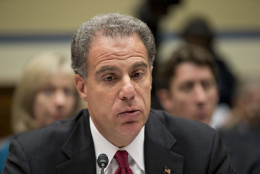Justice Department
-
Federal Freedom of Information Act offices saw a record number of information requests in fiscal 2016, an accomplishment that highlights the need to be able to efficiently and effectively serve stakeholder and citizens.
March 13, 2017 -
The federal inspectors general community has an opportunity, as the federal hiring freeze and other resources continue to tighten, to share administrative and mission areas services.
March 13, 2017 -
In today's Top Federal Headlines, the Government Accountability Office reviews how well agencies are applying the Whistleblower Protections Pilot Program.
March 03, 2017 -
The Justice Department's fraud section has added staff and caseload in the last year. Attorney Kevin Muhlendorf of Wiley Rein joins Federal Drive with Tom Temin with analysis of the latest fraud section year in review.
March 02, 2017 -
The Trump administration's plan to reduce non-defense discretionary spending by 10 percent means civilian agencies will need to look at programs and personnel, not just for this year, but for the long-term. Some fiscal observers says it's time to consider budget process reform.
March 01, 2017 -
The Justice Department’s Office of Information Policy is constantly fighting an uphill battle to improve federal agencies’ responses to FOIA requests.
March 01, 2017 -
President Donald Trump’s first address to a joint session of Congress offered few new insights into his management agenda, only reiterating his desire to reduce regulations.
March 01, 2017 -
At the Justice Department, with so many operations, to look at risk on an enterprise level, what does that mean? Risk knowledge starts with line employees and moves all the way up to policy-makers and those establishing the controls.
February 24, 2017 -
One of the missions for the U.S. Marshals Service is called the Interdiction for the Protection of Children. The program deals with human trafficking and child sex offenders. Dr. Michael Bourke, chief psychologist of the U.S. Marshals spoke about the program with Eric White on Federal Drive with Tom Temin.
February 24, 2017 -
The Justice Department is facing several challenges in 2017 including threats to national and cyber security, overcrowding of prison systems and potential negligence in use of appropriated funds. DoJ's Michael Horowitz and Kelly McFadden discuss the challenges on In Depth with the Justice Department.
February 22, 2017 -
Several revisions to the Freedom of Information Act were passed in June 2016 that may have been shadowed by the election season. Melanie Pustay, director of the information policy office at the Justice Department, told Federal Drive with Tom Temin what those changes mean for FOIA officers and anyone working with federal records.
February 22, 2017 -
Through asset forfeiture and other means, the Justice Department generates billions of dollars to assist state law enforcement agencies on the war against drugs. Kelly McFadden, director of the financial statement and audit office for the Justice inspector general, explained on Federal Drive with Tom Temin how that money is accounted for.
February 17, 2017 -
FBI Chief Information Officer Gordon Bitko said there’s nothing wrong with technology-driven innovations that help employees perform their missions. The problem is the lack of coordination from on high.
February 14, 2017 -
Battling on both the judicial and immigration fronts, the Trump administration over the past week faced a legal setback to its action on immigration from seven countries. The issue was before the Ninth Circuit Court of Appeals, likely en route to the Supreme Court.
February 09, 2017 -
Joe Klimavicz, Justice Department chief information officer, is moving DoJ to a Microsoft 365 cloud-based solution to ensure its various components can communicate effectively.
February 03, 2017














